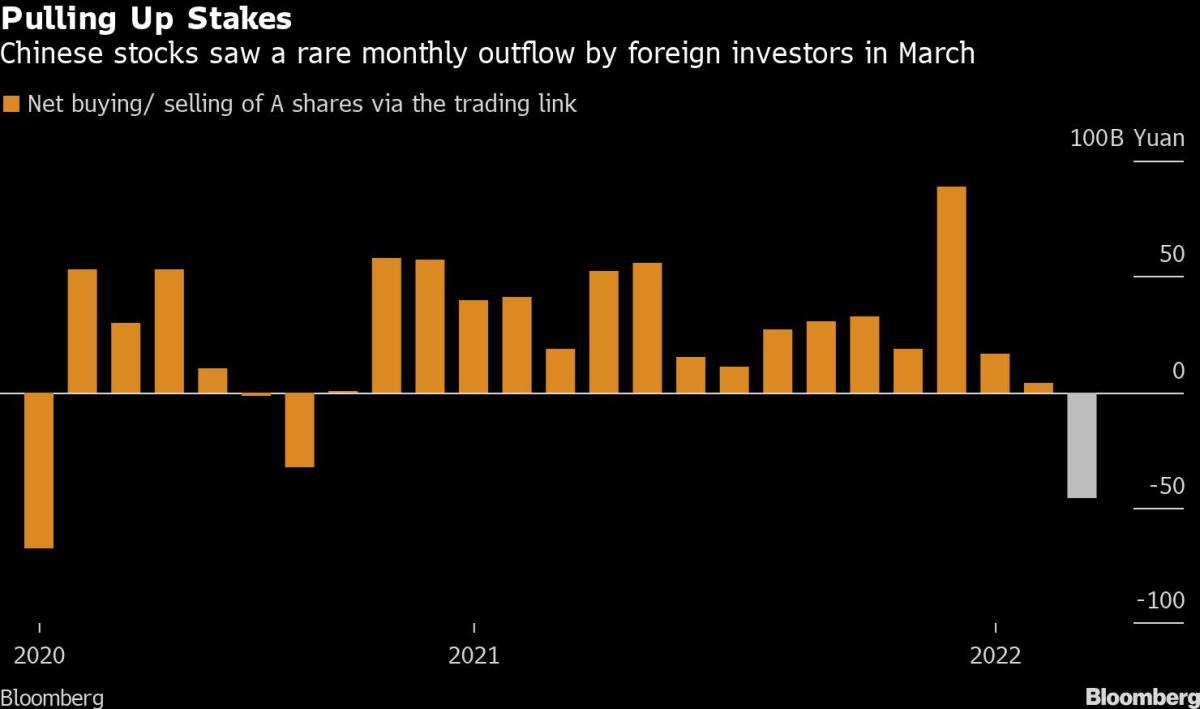Chinese markets fall intensifies as yuan hits lowest level in a year

(Bloomberg) – It’s been a painful week for traders in Chinese stocks, bonds and currencies as growing fears over the fallout from the nation’s Covid Zero strategy send markets tumbling.
Bloomberg’s Most Read
The Hang Seng China Enterprises Index of major mainland companies listed in Hong Kong is among the worst-performing stock indexes in the world this week. The offshore yuan extended its decline, hitting its lowest level in a year. High-yield dollar bonds are heading for the longest stretch of weekly losses since March.
Sentiment towards Chinese assets has deteriorated as Covid lockdowns slow economic growth and political stimulus falls short of investor expectations. Domestic stocks have lost about $2.7 trillion in market value this year, prompting authorities to step up efforts to stem the decline.
“For a change in sentiment, we need to see something sincere from policymakers, either a lot of extra liquidity, a major change in Shanghai’s situation, or a huge surprise that will inject new hope into the market,” he said. said Wang Yugang. , fund manager at Beijing Ax Asset Management Co.
The Hang Seng China Enterprises Index lost 5.6% this week, the biggest drop in more than a month. Other assets are also under pressure, with the onshore yuan on course for its biggest weekly loss since August 2019. Options traders are pricing in further weakness in the currency after it broke below lows on Wednesday. key technical support for the first time since September.
Read more: China’s oil demand falls the most since Wuhan lockdown
“The PBOC is looking to provide additional support to the economy and seems determined to pull as many levers as possible, perhaps with the exception of lower interest rates for now,” Khoon Goh said, Head of Asia Research at Australia & New Zealand Banking. Group Ltd. “Letting the yuan weaken slightly this week seems to be part of the overall ‘support package’.”
Meanwhile, junk dollar bonds are down for a second straight week in the worst such stretch since mid-March. That lessens the initial bounce that stocks got from Beijing’s pledges of support, as investors’ patience for more details runs out.
In a sign of broader concerns, top-rated developers such as Country Garden Holdings Co. saw some of the biggest declines this week. According to Jean-Louis Nakamura, investment director for the Asia-Pacific region at Lombard Odier, any new rally to come can only be sustained if concrete and significant political measures are taken quickly.
Search for support
The authorities are taking measures to stem the decline. In a meeting Thursday with investors, the securities regulator called on the country’s social security giant, banks and insurers to increase their equity investments.
This was followed by a series of articles in state media projecting confidence in the economy and markets. The concerted efforts underscore growing pressure on authorities to boost confidence ahead of a closely watched leadership conference that is expected to confirm an unprecedented third term for Chinese President Xi Jinping.
It is not the first time that the government has urged institutional investors to increase their positions. A similar appeal was launched less than two weeks ago following a request made in October 2019.
READ: When stocks crash, China turns to its ‘national team’: QuickTake
With no end to tough Covid restrictions in sight, foreign investors unloaded 45 billion yuan ($7 billion) of shares in March, the biggest outflow in nearly two years, while global funds reduced their holdings in Chinese bonds by the most on record this month.
Authorities showed little alarm at the outflows, with Fang Xinghai, the vice chairman of the China Securities Regulatory Commission, saying on Thursday that capital outflows will always come back.
“Obviously, Beijing wants to stem the bearish sentiment in both the economy and the stock market,” said Castor Pang, head of research at Core Pacific Yamaichi. “But the economy is like a giant ship, and it takes time to turn around. Even if Beijing wants the market to talk, it is difficult to change the way investors think.
Pension increase
Separately, China also issued guidelines on Thursday on the development of individual pensions, which CICC analysts estimate at a total of 1 trillion yuan in the long term. This could help fuel additional inputs into national actions.
Meanwhile, authorities are trying to resolve a dispute over the audit of Chinese companies listed in the United States, an issue that has weighed on sentiment. The securities regulator speaks every two weeks with the U.S. Public Company Accounting Oversight Board and is “confident” that an audit agreement will be reached, the regulatory commission’s Fang said Thursday.
The Hang Seng Tech index closed 0.3% higher after slipping as high as 3.6% earlier. The continental benchmark CSI 300 ended the session up 0.4%, reversing a loss of up to 1.1%. The gauge fell 4.2% this week to record its worst five-day performance since mid-March.
Still, the rout may be just enough to attract investors. Funds have been on the sidelines waiting for the market to form a ‘double bottom’, a sign that it may be safe to replenish positions.
(Updates second paragraph with prices in yuan.)
Bloomberg Businessweek’s Most Read
©2022 Bloomberg LP






